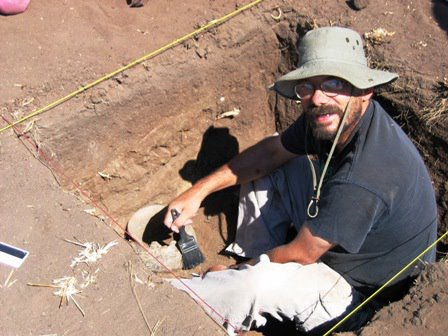As an instructor of undergraduates, I am concerned with providing them at least a basic understanding of evolutionary theory and human evolution. I also find myself concerned largely with correcting misinformation regarding both areas that they are likely to have received from their high school biology class (which typically either teaches nothing about the importance of evolution to biology), the media, or more frightfully, from their religious leaders. Further, if there is indeed a controversial issue, I do my best to highlight the nature of the controversy, provide at least a brief background on the data both "sides" may use, and also give them my two cents as to which position I favor because the evidence or arguments are better.
In this respect Intelligent Design really troubles me. We anthropologists have been trained to attempt looking at a situation from within the context of another culture, so it is almost reflexive on our part to view an issue through the lens of its advocates. When I ask myself, what is it that I am supposed to teach young people about evolution from the intelligent design perspective, I keep coming up blank. Consider, for example, Denyse O'Leary's recent comments (with Jonathan Wells' aid and comfort) on the issue of why textbooks have gone beyond the evidence for promoting Darwin's theory. Together she and Wells continue to beat the drum over the apparent use of Haeckel's embryos as a pillar of evolutionary theory that should not be taught.
So, using this issue as one example, if I am to properly teach students about evolutionary theory, I am supposed to stand up in class and point out that 1) similarities in the embryonic stage are critical evidence used to substantiate evolutionary; 2) these "similarities" actually don't exists; 3) textbooks continue to use Haeckel's drawings of embryos in error (meaning they continue to use embryo similarities as strong evidence - I might also be expected to say something about the devious nature of those promoting evolutionary theory); and 4) as a result of 1, 2 and 3, I should have them draw the conclusion that evolutionary theory is actually on pretty shaky ground.
And the evidence I am supposed to use for this is what? A mid 19th century quote from Charles Darwin, quotes from an out-dated 1975 biology textbook, and two out-of-context quotes from relatively recent textbooks? This is what I need to do to properly "teach the controversy" about intelligent design? This lesson plan will satisfy all of those who say intelligent design is not getting a fair assessment by those of us who teach classes on evolution?
And what about discussions I am NOT supposed to enter into while "teaching the controversy"?
Am I NOT supposed to discuss the fact that there are many similiarities in embryonic stages between species that certainly are explained better by evolutionary development, although not in the way that Haeckel and others first proposed, or the way in which Wells and O'Leary perceive them?
Am I NOT supposed to discuss that Darwin's proposal of natural selection was developed before Haeckel's suggestion of embryonic development recapitulating phylogeny?
Am I NOT supposed to discuss that the majority of recapitulationists Wells and O'Leary cite as evidence for biologists basing evolutionary theory on Haeckel actual condemned Haeckel's ideas?
Am I NOT supposed to discuss that modern textbooks use Haeckel only in a historical sense and that scientists consider Haeckel's ideas as obsolete (and should I NOT, in all fairness for "teaching the controversy" point out that Wells and O'Leary have borne "false witness" in this regard)?
Am I NOT supposed to discuss that Haeckel's embryos were never a critical "pillar" of evolutionary theory, were never used as an argument for Darwin's theory of natural selection, and that, when they are not taken out of context, modern biology texts actually discuss Haeckel's idea in the past tense?
Apparently, what I am NOT supposed to talk about is as critical to teaching intelligent design as what I AM supposed to talk about. I'm sorry, but there's nothing there to talk about. There's no controversy; no data in proper context; nothing but an interesting historical footnote that is certainly no "icon" of evolutionary theory.
If I am going to be justified in teaching Wells' version of Haeckel and the embryos, I would be equally justified in discussing our 21st century understanding of human evolution in the context of Piltdown...
Subscribe to:
Post Comments (Atom)



1 comment:
yeah truly a great site.I really enjoyed my visit.
Post a Comment